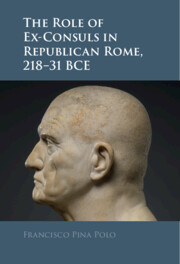Refine search
Actions for selected content:
31 results
7 - Tin Soldiers and Nixon Coming (1970)
-
- Book:
- Waging Peace
- Published online:
- 03 November 2025
- Print publication:
- 13 November 2025, pp 286-327
-
- Chapter
- Export citation
3 - Organized Anarchy (1966)
-
- Book:
- Waging Peace
- Published online:
- 03 November 2025
- Print publication:
- 13 November 2025, pp 80-118
-
- Chapter
- Export citation
Toward a framework for creating trustworthy measures with supervised machine learning for text
-
- Journal:
- Political Science Research and Methods , First View
- Published online by Cambridge University Press:
- 29 September 2025, pp. 1-17
-
- Article
-
- You have access
- Open access
- HTML
- Export citation
Chapter 2 - Consulars between the Second Punic War and Sulla’s Dictatorship (201–82)
-
- Book:
- The Role of Ex-Consuls in Republican Rome, 218–31 BCE
- Published online:
- 01 May 2025
- Print publication:
- 15 May 2025, pp 50-136
-
- Chapter
- Export citation
Chapter 1 - Facing Up to the Crisis
-
- Book:
- The Role of Ex-Consuls in Republican Rome, 218–31 BCE
- Published online:
- 01 May 2025
- Print publication:
- 15 May 2025, pp 1-49
-
- Chapter
- Export citation
Chapter 3 - Consulars between Sulla’s Dictatorship and the Civil War (81–50)
-
- Book:
- The Role of Ex-Consuls in Republican Rome, 218–31 BCE
- Published online:
- 01 May 2025
- Print publication:
- 15 May 2025, pp 137-192
-
- Chapter
- Export citation

The Role of Ex-Consuls in Republican Rome, 218–31 BCE
-
- Published online:
- 01 May 2025
- Print publication:
- 15 May 2025
2 - Democracy
-
- Book:
- Reimagining the American Union
- Published online:
- 02 January 2025
- Print publication:
- 09 January 2025, pp 34-93
-
- Chapter
- Export citation
SENATORIAL DEMOGRAPHY IN THE HANNIBALIC WAR: WAS MARCUS AEMILIUS LEPIDUS (COS. 187, 175) MADE A SENATOR IN 216 b.c.e.?
-
- Journal:
- The Classical Quarterly / Volume 74 / Issue 2 / December 2024
- Published online by Cambridge University Press:
- 04 March 2025, pp. 546-555
- Print publication:
- December 2024
-
- Article
-
- You have access
- Open access
- HTML
- Export citation
3 - The US Congress and the Vietnam War
- from Part I - The Late Vietnam War
-
-
- Book:
- The Cambridge History of the Vietnam War
- Published online:
- 02 January 2025
- Print publication:
- 28 November 2024, pp 72-95
-
- Chapter
- Export citation
Chapter 20 - Conclusion
-
- Book:
- Hannibal and Scipio
- Published online:
- 05 September 2024
- Print publication:
- 26 September 2024, pp 427-435
-
- Chapter
- Export citation
4 - Contingent Elections
-
- Book:
- Why the Electoral College Is Bad for America
- Published online:
- 09 November 2023
- Print publication:
- 23 November 2023, pp 79-98
-
- Chapter
- Export citation
Is the Supreme Court’s Legitimacy Vulnerable to Intense Appointment Politics? Democrats’ Changed Views Around Justice Ginsburg’s Death
-
- Journal:
- Journal of Law and Courts / Volume 11 / Issue 1 / April 2023
- Published online by Cambridge University Press:
- 06 January 2023, pp. 104-115
-
- Article
-
- You have access
- Open access
- HTML
- Export citation
5 - The Choice to Be a Disadvantaged-Group Advocate in the US Senate
-
- Book:
- Representing the Disadvantaged
- Published online:
- 18 November 2021
- Print publication:
- 25 November 2021, pp 124-171
-
- Chapter
-
- You have access
- Open access
- HTML
- Export citation
7 - The Demise of the Senate
-
- Book:
- The Falls of Rome
- Published online:
- 04 September 2021
- Print publication:
- 09 September 2021, pp 300-336
-
- Chapter
- Export citation
2 - The Constantinian Compromise
-
- Book:
- The Falls of Rome
- Published online:
- 04 September 2021
- Print publication:
- 09 September 2021, pp 36-95
-
- Chapter
- Export citation
Chapter 7 - Taking Sides
-
- Book:
- Julius Caesar and the Roman People
- Published online:
- 05 August 2021
- Print publication:
- 26 August 2021, pp 321-412
-
- Chapter
- Export citation
7 - Elite Opinion Formation and Its Electoral Consequences
-
- Book:
- Costly Calculations
- Published online:
- 18 June 2021
- Print publication:
- 08 July 2021, pp 189-220
-
- Chapter
- Export citation
The Heredity of Senatorial Status in the Principate
-
- Journal:
- The Journal of Roman Studies / Volume 110 / November 2020
- Published online by Cambridge University Press:
- 07 September 2020, pp. 29-56
- Print publication:
- November 2020
-
- Article
-
- You have access
- Open access
- HTML
- Export citation
